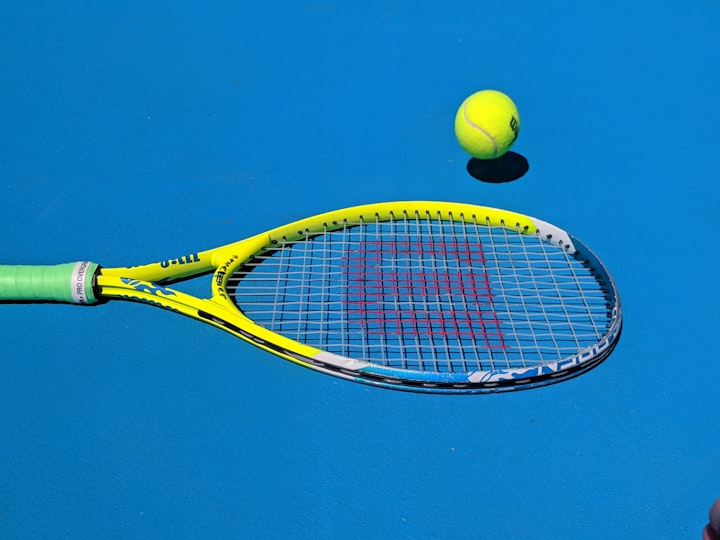Dr. Marshall Hubsher Explains the Physical and Mental Benefits of Playing Tennis
Tennis is a game that offers many physical and mental benefits. Improved cardio fitness and agility, better problem solving, and the satisfaction of winning a close match are just a few examples.

Since exercise is a great way to alleviate stress and increase energy levels, a regular exercise routine will enhance mental alertness and can improve overall health.
Exercising also helps to improve your body's overall response to stress. When you are under stress, your body releases chemicals that cause you to either tense up or go into a panic mode. When your body is tense, it's less able to respond appropriately to stressful situations. Exercises help to reduce the production of these chemicals.
Tennis has been proven to be an effective way for people with depression or anxiety disorders to relieve their symptoms. Tennis provides a great outlet for feelings of frustration and anger as well as anxiety about work or relationships. Research has shown that the physical activity of tennis can help to reduce stress and anxiety, as well as improve self-esteem and mood. The social aspect of tennis is also important because it allows people with depression or anxiety disorders to get out in public and interact with others.
While there are more than just a few benefits of playing tennis, retired psychiatrist Dr. Marshal Hubsher, who himself is a tennis player, has picked some of the most pertinent, covering both the physical and mental side of things.
Physical Benefits
The most obvious benefits of tennis are the physical ones. Running around in the fresh air is a great way to stay motivated, and tennis is a great way to do that.
Heightened Hand Eye Coordination
There is a high degree of hand-eye coordination required in tennis. It requires great timing, efficient movement to the ball, a technically sound swing, and speedy recovery.
According to Dr. Marshall Hubsher, it is impossible to achieve all of these skills without great spatial awareness and great hand-eye coordination - tennis is a sport that demands both!
When playing a sport like golf, you must be very technically sound to produce a solid swing. Even though the racket and ball of a tennis racket are much larger than the head of a golf club and the ball of a golf ball, if you want to hit a ball cleanly, you have to recognize where it will land, what it will do after it bounces, and make very small changes very quickly.
Tennis requires you to hit the ball on both sides of your body and use both hands in unison, which is another great benefit. The key to playing good tennis is to keep an eye on the ball and track where it will land and what you should do in preparation for your shot.
You can improve your hand eye coordination when playing tennis by judging depth, analysing the court's geometry, and understanding how your inputs influence the outcome.
Improved Cardiovascular Capabilities
Playing tennis for hours on end will significantly improve your cardiovascular health. The ability to maintain a constant level of fitness throughout a training session or match depends on your cardio.
Running or cycling for example, may not give you the same type of fitness you are used to. Tennis involves a lot of explosive movement and short breaks between points, so developing your fast twitch muscle capabilities is a great way to improve your endurance.
Mental Benefits
Tennis is a sport that requires an incredible amount of mental strength. There is no doubt that this area determines the fate of most matches.
Improves Problem-Solving Skills
The mental aspect of tennis is that it is a game of problem-solving. In tennis, virtually every shot you hit is a reaction to what your opponent throws at you. Few other sports require as much problem solving as tennis, explains Dr. Marshal Hubsher.
Getting caught up in one's ego and expectations can lead to self-destructive behavior when playing tennis. The simplest way to approach the game is to play the ball in front of you, and take each point as it comes. In spite of that, it is much easier said than done, and you will always need a strategy when playing tennis.
To be successful on the court, you must have a plan of attack, even if it's just playing to your opponent's backhand as much as possible.
To become a better tennis player, you need to adapt to new conditions, court surfaces, balls, and playing styles!
Enhances Mental Resilience
Tennis' scoring system makes it possible for you to win more points than your opponent and still lose! To play good tennis and overcome adversity, you must be extremely resilient.
Tennis greats have shown that learning from your mistakes and not letting them define you is something that can be applied both in life and on the court.
Community Building and Socializing
In addition to being a great way to meet new people, playing tennis is also a great way to have fun!
Being able to play tennis is a great life skill that can help you socialize all over the world, whether you are playing with family and friends or joining a local tennis club.
Moreover, playing doubles and being a part of a team is a great way to share that competitive spirit with other like-minded individuals, further adding to the sport's enjoyment.
A Feeling of Accomplishment
As tennis is such a difficult sport to master, it can actually make you feel accomplished when you succeed! In tennis, as in many other sports, it can be extremely frustrating to play when your game just doesn't come together. However, it's this high degree of difficulty that makes playing well and being in the zone so rewarding.
Winning a tennis match (especially when you're not playing your best) can also give you a great sense of accomplishment. The satisfaction of coming through a close tennis match and getting over the finish line ahead of your opponent is a great feeling, since the stress and adversity experienced during the match cannot always be seen in the score.
Focus and Self-Control are Improved
Tennis has another major mental benefit in that it forces you to think about yourself and understand what you can and cannot control. We can easily get caught up in things that are outside of our sphere of influence, making this an extremely important life skill.
You may have to adapt to a different opponent each time you play, but when it comes to tennis, there is little point worrying about things you can't control.
In order to take pressure off yourself, focus on what you can control and adjust your expectations, you can appreciate when your opponent hits a good shot rather than blame yourself for not hitting the ball well enough. It is important to accept that you will lose a lot of points even if you win a straight match on paper and know that no one has ever 'completed' tennis.





Comments
There are no comments for this story
Be the first to respond and start the conversation.